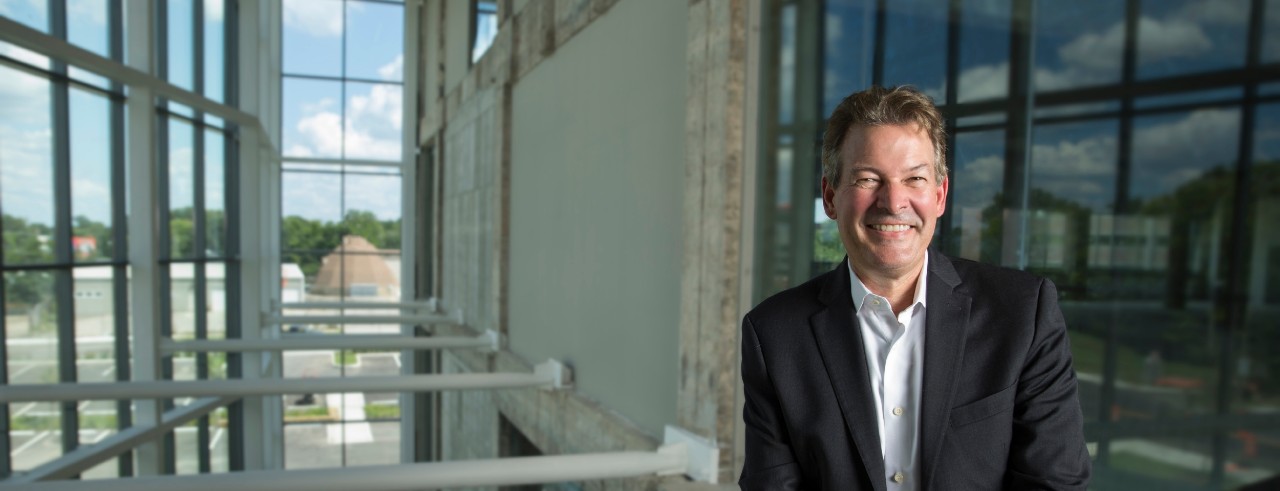
UC takes innovative approach toward solving health challenges
1819 Innovation Hub hosts workshop for Urban Serving Universities
Colleges and universities with academic health centers or medical schools, such as the University of Cincinnati, have the unique opportunity to have a direct impact on the health and well-being of their communities. UC hosted a workshop in September to spark ideas and innovation for other similar universities.
Several such institutions took part in the Urban Serving Universities (USU) Social Determinants of Health Innovation Workshop hosted by UC, Sept. 24-25 at the university’s 1819 Innovation Hub.
The Innovation Hub was the appropriate setting as explained in the opening session by Drew Boyd, professor of marketing and innovation at the UC Carl H. Lindner College of Business.
“What I plan to do is to help you use your brain in a different way than you normally do,” Boyd told the group. “It will help you produce ideas you wouldn’t have thought of otherwise.
Prior coming to the workshop, each of the 22 USU-affiliated colleges and universities in attendance identified a challenge in health care to be addressed in their community. While the UC team focused on mental health access, other groups identified different issues including poverty, homelessness, access to transportation, social isolation and suicide.

Greer Glazer speaking to the USU workshop
Greer Glazer, dean of the UC College of Nursing, asked the group to use the workshop to think of different approaches to those challenges.
“Those of us who have been doing this for so long, we’ve been trying to impact the issues, but yet we keep trying the same things over and over, and we get the same results,” Glazer said. “I really believe you’re going to get some new information and it will cause you to think differently. You will come up with some ideas that you have absolutely never thought of.”
This workshop is exemplary of the innovation and urban impact agendas highlighted in UC's Next Lives Here strategic direction.
David Adams, chief innovation officer for UC, introduced the Innovation Hub space, explaining that it had opened up in October 2018 as a place where students and faculty who want to start businesses can come through a venture lab and a process were they can be connected to capital, teams and organizations to help accelerate the entrepreneurial agenda.
“We’re very fortunate that dean Glazer here is a trailblazer at the University of Cincinnati,” Adams said. “For the past two years, all freshmen nursing students have been going through our makerspace. As I got to know Greer, she indicated nursing students are at the bedside and have all kinds of ideas for products to help patients, but don’t know what to do with those ideas. Here at UC, we provide the tools and education to help bring those things to life.”
Under the guidance of Boyd, representatives from each of the institutions wrote the health care issue they had identified as their focus on a flip chart using visuals or diagrams. Then, all the groups went around the room on a gallery walk, pausing to review and discuss the listed issues. Once the groups had reassembled, Boyd facilitated group discussions about the various issues.

Drew Boyd speaking during the gallery walk
Boyd also introduced the gathering to systematic inventive thinking. According to Boyd, in the 20 years since its inception, the method has been expanded to cover a wide range of innovation-related phenomena in a variety of contexts. The techniques are based on patterns used by mankind for thousands of years to create new solutions.
Jennifer Danek of Urban Serving Universities says the participants came away from the workshop armed with new skills to tackle the health care issues in their communities.
“University teams gained tools from Drew Boyd for practicing innovation and creativity and apply them in real-time to the health challenges they are tackling in their urban communities,” Danek says. “The team-based approach was particularly effective, as many of the issues affecting health — for example food insecurity or transportation — can’t be solved by experts in one discipline. It requires working across sectors to create new approaches, and it's helpful to do this with colleagues tackling similar issues in other cities.”
For more information about the UC 1819 Innovation Hub, click here.
Related Stories
Before the medals: The science behind training for freezing mountain air
February 19, 2026
From freezing temperatures to thin mountain air, University of Cincinnati exercise physiologist Christopher Kotarsky, PhD, explained how cold and altitude impact Olympic performance in a recent WLWT-TV/Ch. 5 news report.
Discovery Amplified expands research, teaching support across A&S
February 19, 2026
The College of Arts & Sciences is investing in a bold new vision for research, teaching and creative activity through Discovery Amplified. This initiative was launched through the Dean’s Office in August 2024, and is expanding its role as a central hub for scholarly activity and research support within the Arts & Sciences (A&S) community. Designed to serve faculty, students, and staff, the initiative aims to strengthen research productivity, foster collaboration, and enhance teaching innovation. Discovery Amplified was created to help scholars define and pursue academic goals while increasing the reach and impact of A&S research and training programs locally and globally. The unit provides tailored guidance, connects collaborators, and supports strategic partnerships that promote innovation across disciplines.
Blood Cancer Healing Center realizes vision of comprehensive care
February 19, 2026
With the opening of research laboratories and the UC Osher Wellness Suite and Learning Kitchen, the University of Cincinnati Cancer Center’s Blood Cancer Healing Center has brought its full mission to life as a comprehensive blood cancer hub.
